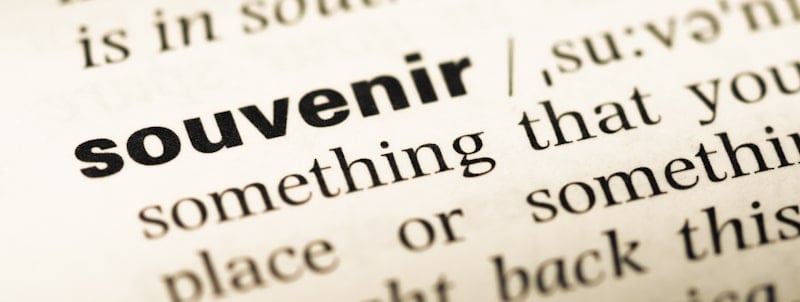It might be very challenging to tell which spelling of the words “souvenier” and “souvenir” is accurate. Some terms in the English language, like these words, have similar pronunciations and spellings. We will describe the distinctions between these two words and how to choose the right one as you read this article.
The word “souvenier” is the alternate spelling of the word “souvenir.” “Souvenir” and “souvenir” are nouns, but “souvenier” is a variant spelling of “souvenir,” and a “souvenir” is a memento that serves as a reminder of a particular occasion or place. The correct word to use is “souvenir.”
For a few years, the word was spelled “souvenier,” but nowadays, “souvenir” is far more frequently used on signage in tourist attractions or businesses selling souvenirs. We will learn more about using the word “souvenir” in a sentence.

What Do The Words “Souvenier” And “Souvenir” Mean?
The two words “souvenier” and “souvenir” are pronounced the same, so most people do not know which spelling to use when writing. We will explain the difference between these words, their definition, and their etymology.
The word “souvenier” is an old way or obsolete alternative to spelling the word “souvenir.” The letter “e” between the letters “I” and “r” is the only difference between the spellings. But its use is not widespread.
Since the word “souvenier” is obsolete, writers are advised against using it when writing. If you are typing and you use the word “souvenier” in your sentence, your device will indicate that such a word is incorrect and does not exist.
The word “souvenir” can be defined as a memento or a keepsake of anything. It also refers to a memento that serves as a reminder of a place or an occasion. This word can also mean something of special meaning or a reminder of the past.
This word can also refer to something that serves as a memento of a particular person, location, or event. It also means something that is taken as a keepsake. A souvenir might be a physical item or a piece of writing obtained in honor of an individual or an occasion.
When the recipient must take it home as a memento for the owner, a souvenir is essential at events and conferences. It is typically used at meetings and events where the recipient must keep it as a reminder of the host or event. Additionally, it serves as an honorific sign for the recipient.
In other words, it is an item the recipient preserves as a memento of that significant occasion. The word “souvenir” also refers to a memento that serves as a reminder of a place or an experience.
A person purchases a souvenir or token of remembrance for the memories it brings back. Any object a traveler can gather, buy, and take home as a reminder of their trip qualifies as a souvenir.
The tourism industry defines souvenirs as commemorative goods connected to an area, frequently containing geographic information, and typically made in a way that encourages souvenir collecting.
The sale of souvenirs is a significant component of the global tourism industry that serves two purposes: first, it helps the local economic growth, and second, it allows visitors to bring home a memento of one‘s trip, which, in turn, promotes the destination to other travelers through word-of-mouth advertising.
As objects, souvenirs can be mass-produced goods like T-shirts and hats, collectibles like postcards and refrigerator magnets, key chains, and pins. Other non-mass manufactured goods that people gather as souvenirs include folk art, regional handicrafts made by local artisans, items that depict the customs and culture of the region, and non-commercial natural materials.
The word “souvenir” was derived from the Middle French word ‘soubvenir,’ which is from the Old French word ‘sovenir.’ This word was coined from the Latin word ‘subvenīre,’ which is the present active infinitive form of the word ‘subveniō,’ which means ‘occur to or come to mind.’
Synonyms of the word “souvenir” include memento, tribute, token, trinket, item, giveaway, freebie, gift, present, remainder, decoration, and legacy. The word “souvenir” antonyms include castoff, discard, and normality.
More Word Comparison Posts
How To Properly Use The Words “Souvenier” And “Souvenir” In A Sentence
As stated earlier, the word “souvenier” is no longer the correct word to use in the English language due to the advancement that has occurred. The correct spelling of this word is “souvenir,”; hence, as a writer, you should only use the correct spelling of a word.
The word “souvenir” functions as a noun in a sentence. It is used to refer to a memento that serves as a reminder of a place or an occasion. It is also used when describing any object a visitor can collect or buy, then bring home as a reminder of their trip.
You can use the word “souvenir” in a sentence when referring to an item that serves as a memento of a particular person, location, or event. You use it to refer to an article that serves as a remembrance of the past. It is also used to describe anything with sentimental worth.
The plural form of the word “souvenir” is “souvenirs.” It is also used when describing something people keep to remember a vacation or other occasion. You can also use this word as a verb when referring to taking an item as a souvenir, particularly without permission, as would occur during a conflict.

Examples Of The Words “Souvenier” And “Souvenir” Used In Sentences
Having understood the definition and usage of the words, we will provide some examples of the words in a sentence. Below are examples of the word “souvenir” in a sentence.
- The card offers a 10 percent reduction on products at particular souvenir shops by including a minimum purchase of $10 and a 10 to 15 percent meal discount at specific restaurants, in addition to automatically covering parking expenses.
- Additionally, each park provides a range of rides and other activities, such as motion simulators, kid-friendly play zones, beautiful greenery, playgrounds, souvenir shops, and a selection of restaurants.
- It provided its customers with lubricious instruction in the process of making love and a souvenir of or an advertisement for the delights found in the prostitute districts.
- Suppose you are looking for a unique way to remember your visit to this stunning Northern California location. In that case, South Shore clothing is the ideal memento for both yourself and as a souvenir for others.
- This is a lively area since, throughout the day, it is crowded with souvenir shops and blissful couples and grooms getting married.
- After finishing the excision and taking his souvenir, he gave the victim the finishing blow: a single, deep cut across the neck, going from right to left, and then left the body in the basement.
- With its picture printed on souvenir caps, shirts, flasks, and other knick-knacks, the sign now generates several hundred thousand dollars in revenue for the chamber each year.
- According to the report, purist bookshops felt the souvenir vendors alienated their Paris-based customers, and half of those surveyed said business was terrible.
- Richardson noted that despite the original courtyard buildings’ lantern-hung ceilings and woodwork fronts, they are now bars, hotels, and souvenir shops.
- A souvenir sick pouch might be precisely what you want if the British coronation is too much for you to handle and you’re sick of seeing William and Meghan being forced down your throat.
Final Thoughts
Due to the development of the English language, most people use the word “Souvenir” because they believe it to be more appropriate. Therefore, you should check a dictionary before employing words because they might occasionally be ambiguous, as in “Souvenir or Souvenier.” Any digital device will indicate that “Souvenier” is erroneous and should be changed to “Souvenir.”
Shawn Manaher is the founder and CEO of The Content Authority. He’s one part content manager, one part writing ninja organizer, and two parts leader of top content creators. You don’t even want to know what he calls pancakes.

